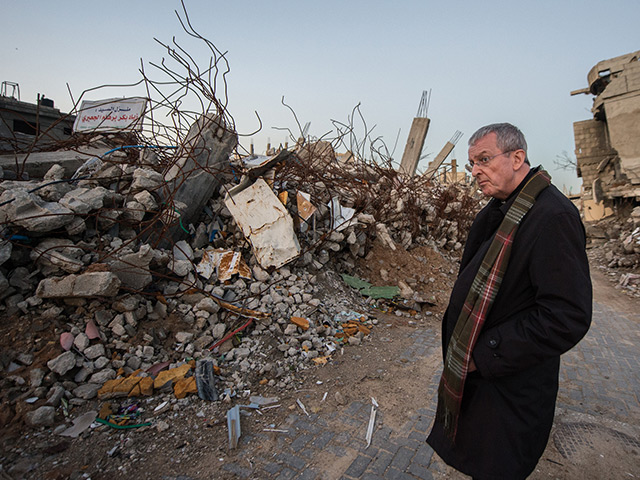
The following article was published in The Catholic Universe, Friday 25 November, in it Bishop Declan Lang discusses why we need to strengthen the international justice system in the wake of historic judgements and worrying trends.
*************
In 2012 Ahmad al-Faqi al-Mahdi led a group of Islamist militants as they destroyed ancient mausoleums in Timbuktu with pick-axes and crowbars during a brief but brutal occupation of the remarkable city. In September he was sentenced to nine years in prison following a landmark trial at The Hague, which marked the International Criminal Court’s (ICC) first ever conviction for the war crime of deliberately attacking historical monuments or religious buildings.
Around the world legal and cultural experts welcomed this as an important moment for international justice. During the trial prosecutors had compared the destruction in Timbuktu to Daesh wrecking Syria’s historic city of Palmyra and the Taliban dynamiting Afghanistan’s famous Bamiyan Buddha statues. As the trial concluded the judge expressed his hope that al-Mahdi’s conviction would deter others from carrying out such crimes in the future.
Perhaps even more significantly it also marked the first time that an Islamist militant has been convicted by the ICC since it was formed in 2002, lending some hope that the international community may eventually be able to deliver justice to victims of groups such as Boko Haram and Daesh. Several countries including the UK had already begun compiling evidence of Daesh’s crimes for use in future trials and are likely to be encouraged by the conviction.
These developments came in what has already been an extraordinary year for international justice cases. Back in spring Jean-Pierrer Bemba Gombo, formerly Vice President in the Democratic Republic of Congo, became the first person convicted of rape as a war crime following a monumental trial at the ICC involving more than 5,000 victims. It was not only a victory for those who suffered the wrath of his infamous militia but also a significant step forward in the global struggle against sexual violence in warfare.
Just days later Radovan Karadžić, who led Bosnian-Serb forces responsible for the 1992 massacre at Srebrenica, was convicted of genocide at the International Criminal Tribunal for the former Yugoslavia (ICTY) and sentenced to forty years in prison. The ICTY has now convicted more than eighty senior figures, from all sides of the conflict, for committing genocide, crimes against humanity and war crimes.
However, these achievements come in the context of several far more depressing trends, with many states today distancing themselves from international justice systems. Most drastically, this month Burundi became the first country to ever withdraw from the ICC after the court moved to investigate crimes against humanity including torture, rape, and murder by the government forces currently cracking down on opposition movements.
Beyond the immediate impact in Burundi itself, human rights advocates fear this may cause a chain reaction of withdrawals by other African countries, many of which regard the court as inherently biased against their continent. Already South Africa and Namibia have indicated their intention to leave the court’s jurisdiction, raising the prospect of its limited reach shrinking even more.
The ICC’s authority has also been persistently undermined by the refusal of several countries, including some of its members, to cooperate over international arrest warrants. In the years that have passed since Sudanese President Omar al-Bashir was indicted on charges of crimes against humanity and genocide, he has travelled to scores of countries without being detained for extradition to The Hague.
Djibouti, South Africa, Chad and the Democratic Republic of Congo are all among the ICC members who have recently hosted al-Bashir, and were accused by human rights groups of shamelessly flouting their obligations to international justice. Countries outside the court’s jurisdiction including India, China, Qatar and Saudi Arabia have also allowed him to visit without the threat of arrest, further strengthening his impunity.
In addition to these serious challenges facing the ICC, we are also witnessing grave violations of the Geneva Conventions particularly in conflicts throughout the Middle East. Indiscriminate bombing, chemical weapons, cluster munitions and sieges are regular features of the violence in Syria, with little indication that those responsible will find themselves restrained by international law or likely to face justice in the near future. The recent attack on an aid convoy bringing relief to civilians in Aleppo has been widely condemned as a war crime, yet those responsible for devastating the city have simply denied involvement and continued their offensive.
Similarly forces fighting in Yemen have been accused of violating international law by deliberately bombing civilian targets, using cluster munitions, and shelling densely populated areas. Once again international courts and conventions have clearly failed to act as a deterrent to the perpetrators, and accountability for their crimes feels like a distant hope when even the fighting itself has no end in sight.
These violations should not be a reason to abandon international law as futile, but rather an urgent call to improve its effectiveness. Now is the moment for governments to put more resources into institutions like the ICC and deal seriously with concerns about its operations, while exploring new ways of encouraging states to detain fugitives and comply with humanitarian conventions.
We must never forget that the international legal framework which exists today has its roots in the world’s response to horrors of the Second World War and the Holocaust. While deeply flawed, it is still one of the most important ways of challenging human rights abuses and bringing those responsible to justice. Against the backdrop of conflict and atrocities that we face today there has never been a more pressing time to make it stronger.